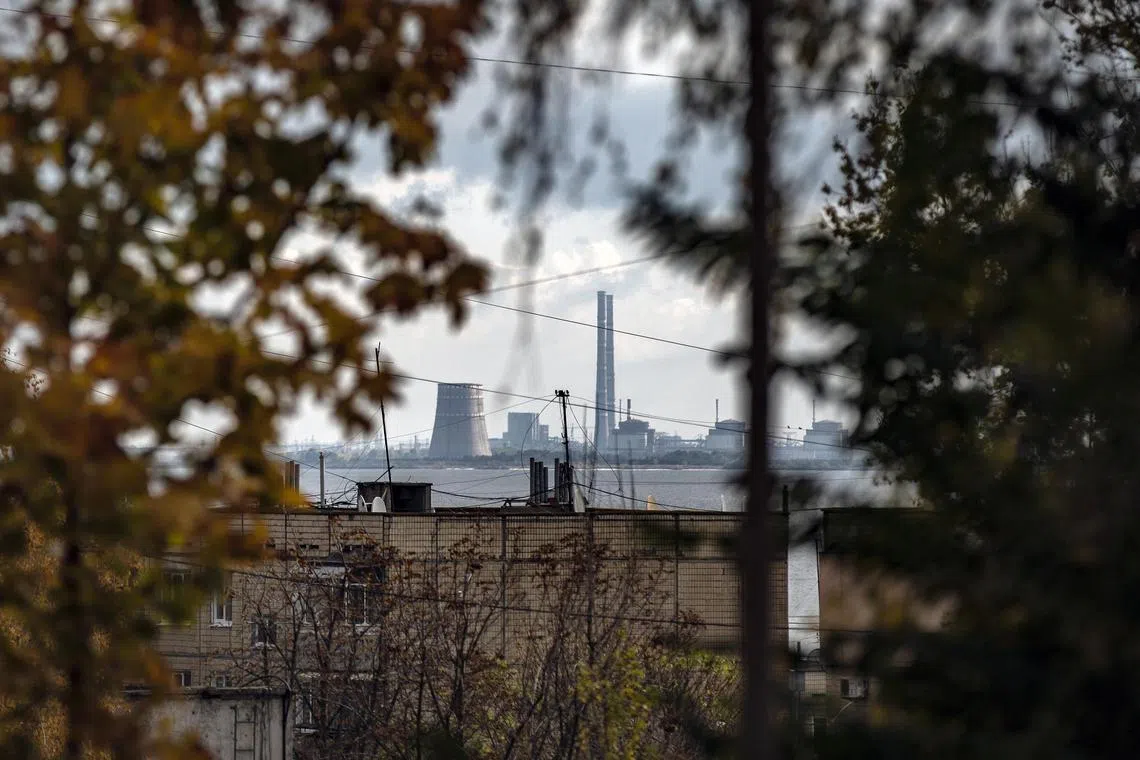Trump floats US takeover of Ukraine nuclear plants
Sign up now: Get ST's newsletters delivered to your inbox

Ukraine’s Zaporizhzhia Nuclear Power Plant – Europe’s largest – was captured by invading neighbour Russia in 2022.
PHOTO: NYTIMES
WASHINGTON - US President Donald Trump told his Ukranian counterpart Volodymyr Zelensky on March 19 that the US could own and run Ukraine’s nuclear power plants, as part of his latest bid to secure a ceasefire in Russia’s invasion of its neighbour.
Mr Zelensky said, following their call,
Mr Zelensky also said he had discussed Mr Trump’s power plant takeover plan.
“We talked about only one power plant, which is under Russian occupation,” Mr Zelensky, who was on an official visit to Finland, said during an online briefing, referring to the plant in Zaporizhzhia.
He added that he had “not felt any pressure” from Mr Trump to make concessions to Russia.
But a wider ceasefire remains elusive, with the Kremlin leader insisting in his own call with Mr Trump on March 18 that the West first stop all military aid for Ukraine.
Republican Trump’s tone was markedly more positive after the Zelensky call, with the White House describing it as “fantastic” – despite the fact that the two men had a blazing televised row
Mr Trump “discussed Ukraine’s electrical supply and nuclear power plants” and said Washington could be “very helpful” in running them, National Security Adviser Mike Waltz and Secretary of State Marco Rubio said in a joint statement.
“American ownership of those plants would be the best protection for that infrastructure and support for Ukrainian energy infrastructure,” they said.
‘Ending the war’
Mr Trump also pledged to help Kyiv get more air defence equipment from Europe, and to find Ukrainian children “abducted” by Russia, the statement said.
The US President earlier said on his Truth Social network that efforts to reach a full truce were “very much on track”.
Mr Zelensky said Ukrainian and US officials could meet in coming days for fresh talks in Saudi Arabia, where Russian and American teams are also due to meet early next week.
Russia and Ukraine exchanged 372 prisoners, Moscow said on March 19, which was planned as a goodwill gesture following the Trump-Putin call.
Kyiv and Moscow, however, accused each other of continuing attacks.
Ukraine’s Defence Ministry said an overnight barrage of Russian missiles and drones
Ukraine’s national railway service said the barrage had hit railway energy infrastructure in the central Dnipropetrovsk region.
Russia’s Defence Ministry reported a “deliberate” Ukrainian attack overnight on an oil depot in the south of the country, which it said was aimed at “derailing” Mr Trump’s attempts to broker an end to the fighting.
“These attacks are countering our common efforts,” added Kremlin spokesman Dmitry Peskov, referring to the US-Russian talks.
‘Don’t believe Putin’
The major sticking point remains Mr Putin’s resistance to a full ceasefire – something that Kyiv and some Western allies say underscores how the Russian leader cannot be trusted.
Mr Putin insisted during his call with Mr Trump on March 18 that a full ceasefire was possible only if the West agrees to Moscow’s longstanding demand to halt its billions of dollars in military aid for Ukraine.
The Kremlin chief also demanded Ukraine must not be allowed to rearm and must halt mandatory mobilisation.
Moscow and Washington were even at odds on the results of the call. The Kremlin said they discussed only halting power plant attacks, but the White House insisted the talks covered both energy and other civilian infrastructure.
Mr Trump’s overtures to Mr Putin, and indications Washington will no longer guarantee European security, have spooked Kyiv and the US’ Nato allies.
“I don’t believe Putin at all, not a single word. He only understands force,” said Kyiv resident Lev Sholoudko, 32.
In Moscow, locals were more optimistic the talks could bring an end to the fighting – to Russia’s advantage.
“Definitely this is in our favor,” said Moscow resident Larisa, 46. “There is no other way. What happened in 1945 will happen now,” she added, referring to the Soviet Union’s victory over Nazi Germany. REUTERS


